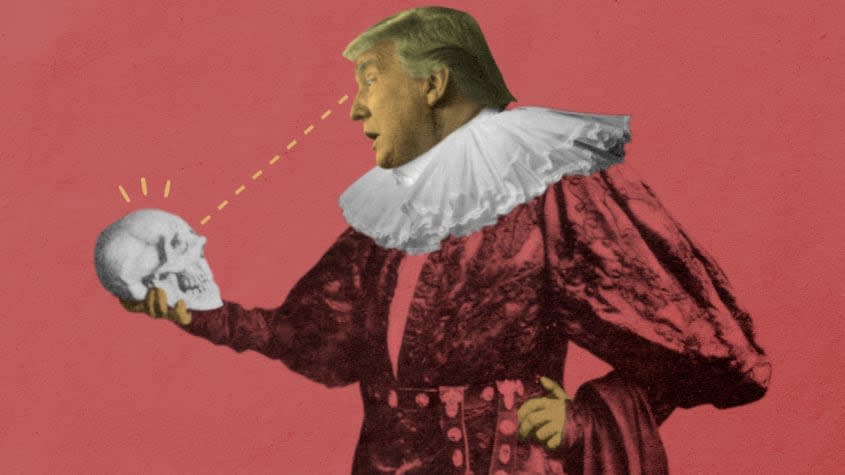Trump's small, sad revelation of his own mortality

Former President Donald Trump's statement on the death of Colin Powell reads, at first glance, like the quintessential Trumpian obituary.

Donald Trump/Twitter/@NikkiSchwab
There's the sneering sarcasm ("wonderful to see Colin Powell ... treated in death so beautifully"), the blatant hypocrisy ("big mistakes on Iraq," a war Trump himself supported and prolonged), the undisguised insults ("he was a classic RINO, if even that"), a completely off-topic swipe at the "Fake News Media," and just enough outrageous trollishness ("but anyway, may he rest in peace!") to ensure his words would be rapidly disseminated across social media despite his bans on major platforms.
But tucked into the obituary is also something very odd, very uncharacteristic, and potentially very revealing: a reference to Trump's own death. "Hope that happens to me someday," he jokes in the obituary's most concise sentence, a reference to the positive posthumous re-evaluation of the former secretary of state. This is something new, but not wholly new. It seems that since his brush with death this time last year, Donald Trump has been contemplating his own demise.
He does not seem to have contemplated it much before 2020, when he contracted a reportedly serious case of COVID-19. For many years, Trump was openly contemptuous of people who died, as if it were a sign of weakness to shuffle off this mortal coil (perhaps he's unaware of the research-backed correlation between fear of death and Trump support).
"Why should I go to that cemetery? It's filled with losers," he was famously said to have griped when canceling a visit to an American cemetery in France in 2018, going on to call the hundreds of Marines who died in the 1918 Battle of Belleau Wood "suckers" for getting killed. In a 2004 interview with Howard Stern, Trump described seeing an octogenarian crack his head open on the floor of a ballroom after falling off the stage. He admitted to being revulsed rather than concerned: "I thought he died," Trump said. "And you know what I did? I said, 'Oh my God, that's disgusting,' and I turned away."
Trump's belief that those who die somehow had it coming helps explain his tragic lack of urgency during the early days of the COVID-19 crisis. As late as August 29, 2020 — as the U.S. approached 180,000 dead — Trump retweeted the false claim that "only 6 percent" of COVID-19 deaths involved "healthy" people, as if all the others somehow didn't matter because they weren't tough enough to live.
Trump himself, of course, is no paradigm of good health, although he's attempted to pass himself off that way. He demanded his doctor ascribe him the title of "the healthiest individual ever elected to the presidency," bragged (with ample dog whistles) about his great genes, and covered up routine medical procedures while in office. The fact that Trump is a 75-year-old man who seemingly subsists on fast food, diet Coke, and steak, sleeps "like three hours, four hours" a night, and eschews exercise out of innate suspicion tells you all you need to know: This is a man who spent seven decades giving zero thought to his own mortality, either oblivious or actively avoiding the idea.
After his COVID-19 scare, though, that appears to have changed, even if Trump's habits did not. "I could be one of the diers," the president reportedly reflected to a confidant on the phone during his hospitalization at Walter Reed, when aides supposedly feared he could soon be put on a ventilator. "Reflected." New York, reporting the phone call, pointed out the strangeness of that verb: "Donald Trump, the least self-reflective man in America, was contemplating his own mortality."
Later, Trump again conceded that despite his good genes and golfing regime, he might not be as tough as he thought: "This thing could go either way. It's tricky. They told me it's tricky. You can tell it can go either way," he reportedly fretted to his aides. Would he go "out like Stan Chera," a friend who died after being hospitalized by the disease?
Trump's fears were quickly covered by bravado after his release from Walter Reed. "Don't let [COVID-19] dominate your life," he told Americans upon his return to the White House, invincible once more. Only no, not quite — the cracks are still there.
In February, Trump agreed with Newsmax host Greg Kelly's suggestion that the death of Rush Limbaugh made him consider his "own mortality for just a minute." "You do think about it," Trump conceded in what would have been an out-of-character admission mere months before. Trump's whole tune was noticeably different: "He just got a bad deal with what he had," he said of Limbaugh's cancer. "It was not something that was going to be beaten, and he understood that."
In the Powell statement, Trump's acknowledgment of his own mortality is clearly written as a joke. But often his most revealing and truthful statements are coded as humor, and he's always been paranoid, a germophobe who nurses "a long-term fear of being poisoned" and disgust for people living with a disability or illness.
Still, the former president hasn't let slip many public reminders that he, too, is only a man. At least, he hasn't until now, in this small, sad attempt to mock the death of a political adversary.
You may also like
Rep. Jeff Fortenberry indicted on charges of lying to federal investigators


